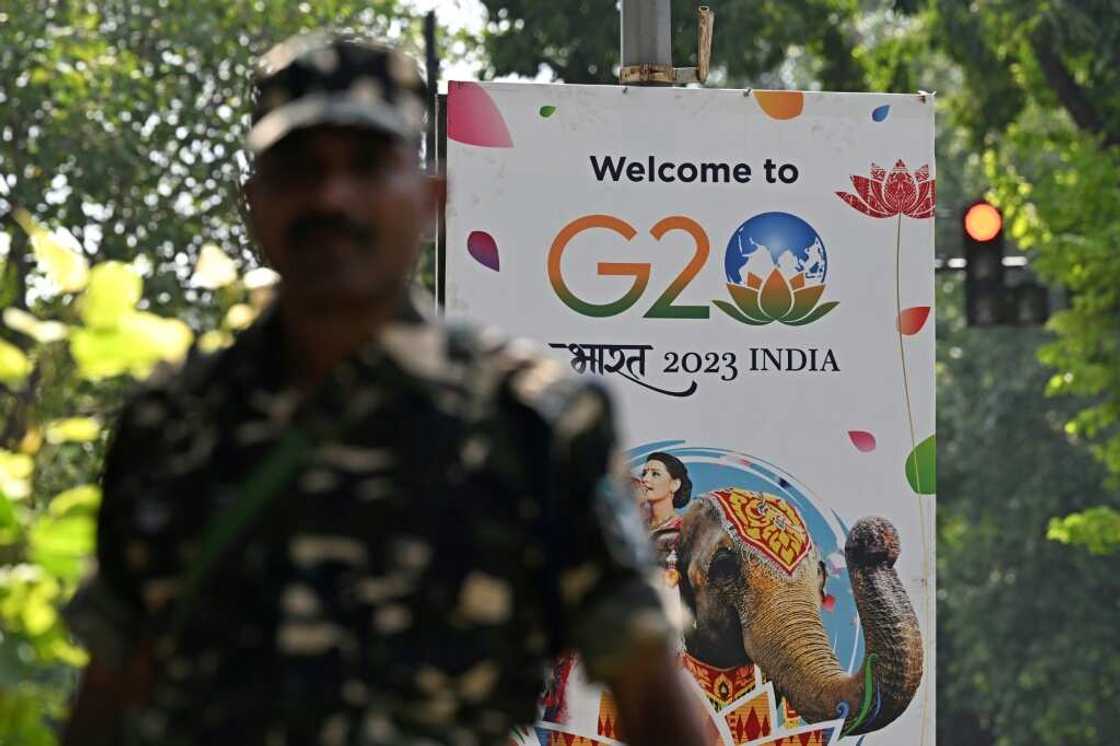G20: India's New Delhi readies for global summit

Source: AFP
Special forces, bulletproof cars and men hired to chase away monkeys are among India's elaborate G20 preparations as Prime Minister Narendra Modi readies for a weekend in the global spotlight.
Photos of a beaming Modi are lining streets across the capital New Delhi to welcome world leaders to the summit, the most powerful gathering India has ever hosted.
Modi has used the G20 presidency to burnish his image at home and abroad as a steward of national power and prosperity, a powerful branding exercise to assert India's place in the world ahead of general elections next year.
India overtook former colonial ruler Britain last year to become the world's fifth-largest economy, and this year surpassed China to become the most populous country.
Here's how authorities have rolled out the red carpet.
Rooftop snipers and 'Black Cats'
Security operations involve tens of thousands of security personnel, including rooftop snipers and anti-drone technology.
PAY ATTENTION: Сheck out news that is picked exactly for YOU ➡️ find the “Recommended for you” block on the home page and enjoy!
India's counter-terrorism "Black Cats" guards have been practising rapid deployments from helicopters, rappelling down ropes onto hotel roofs where presidents will be staying.
Traffic police have promised "elaborate regulations" with a huge restricted zone slapped across much of the city centre, and bullet-proof limousines will ferry visiting leaders.
Businesses have been ordered shut and a holiday declared -- meaning normally jam-packed streets and their ubiquitous honking motorised rickshaws will fall silent.
The summit takes place in Bharat Mandapam, a recently revamped conference centre.
The sprawling riverside site lies close to the towers of the 16th century Mughal-era Purana Qila fort, as well to Raj Ghat, the memorial to Mahatma Gandhi at the spot he was cremated -- and where G20 leaders are expected to plant trees.
Clean-up drive
The Delhi metropolitan area, home to around 30 million people, has been on an intense beautification drive since India assumed the G20 presidency last year.
City authorities are hoping to dispel the megacity's reputation for chaotic roads and pollution.
More than 4,000 homeless people living under bridges and on roadsides in the city centre have been moved into "shelter homes" ahead of the summit, according to municipal officials.
Several long-closed fountains are running again, while roadside markings that faded years ago are gleaming with a fresh lick of paint.
Some 70,000 flower pots have been set out across the city. Maintaining and monitoring the foliage has become a major task in itself, with 35 water tankers deployed to keep the plants green, the Times of India reported.
Statues have popped up across the city centre, including a 28-foot-tall (8.5-metre-tall) figure of the Hindu god Shiva at the G20 summit venue entrance.
Monkey-men and mosquitofish
A team of more than 30 "monkey-men" have been deployed and primate cutouts erected to deter marauding monkeys from munching on floral displays laid out for global leaders.
Monkeys are a major menace in the city, often trashing gardens, offices and residential rooftops and even viciously attacking people for food.
The men mimic the hoots and screams of the aggressive langur monkey -- the natural enemy of the smaller rhesus macaque primates that wreak havoc in the capital's leafy government areas.
Officials however halted a bid to solve another city challenge -- to round up and hide thousands of stray dogs -- after the canine-catching scheme sparked anger from Delhi residents and animal rights activists.
New Delhi suffers from both mosquito-borne dengue and malaria, and eight teams equipped with insecticide sprayers are dousing likely mosquito-breeding sites across the G20 venue, the Hindustan Times reported.
One official told the newspaper that batches of larvae-eating mosquitofish were released ahead of the conference into around 180 lakes and fountain pools.
Source: AFP





